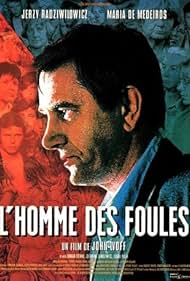Paul Markovic suffers from Stendhal syndrome. It is to Dr.Giordano that he tells his monstrous secret.Paul Markovic suffers from Stendhal syndrome. It is to Dr.Giordano that he tells his monstrous secret.Paul Markovic suffers from Stendhal syndrome. It is to Dr.Giordano that he tells his monstrous secret.
Photos
Tomasz Preniasz
- Igor
- (as Tomasz Preniasz-Strus)
Malgorzata Jarmalkowicz
- Torturowana kobieta
- (as Malgorzata Jarmulkiewicz)
Storyline
Featured review
Much of the action of "Man in the Crowds" ("L'homme des foules")(in the form of narrated flashbacks) takes places in an unnamed Eastern Bloc country. These scenes are filmed in Poland, and most of the actors are Polish, but in the film they all speak Russian. Most likely, the reason for this is that, while for some reason or other it was easier to get Poles rather than Russians to play in the film, the film-makers wanted the Russian language in the film, because it more strongly evokes stereotypical cliches of the trashy cold-war movie variety. It would seem that the filmmakers feel that that the absurdity of shooting Poles in Poland speaking in Russian doesn't much matter, since it seems that they would have you believe that the largest and most diverse ethnic, cultural, linguistic, and geographic group in Europe - the "Eastern Europeans" - are all the same anyway.
This film, apparently written by France's most prominent screenwriter, uses its "Eastern European" characters in much the same way that many Hollywood films used them during the Cold War, or the way it used Yugoslav characters later: to - in a shallow and uneducated way - create the concept of a foreign, suspect, off-putting alternative to the morally secure West - as a vehicle for a black&white portrayal of right and wrong; goodies and baddies. When Hollywood films do this, it's bad enough, but when it's done by a film which considers itself an "art film", that's even worse.
If, for example, in Poland or Russia a film was made which was set in France, and in which the actors were French, but spoke in German, or in Italian - this purposeful linguistic and cultural mismatch being considered unimportant by the filmmakers because the film was about 'universally Western and capitalistic issues' - the film would be laughed off the screens for the sheer idiocy of its premise.
Eastern Europe is a concept which can only legitimately exist in a geographic sense. The countries within "Eastern Europe" are as - or more - diverse culturally, linguisitcally, religously, and ethnically as those within "Western Europe", and can no longer said to be similar economically or politically. So it is unfortunate to see such a film made in 2000 (which in educated hands could definitely have been worthwhile) treat the subject matter of Communist Europe in such a naive, sub-consciously racist, and pseudo-intellectual manner. I can only hope that my hunch that this film will be praised as a "bold work surveying the often dim and uncharted history of the Eastern Bloc, as it awakens towards democracy' is wrong.
This film, apparently written by France's most prominent screenwriter, uses its "Eastern European" characters in much the same way that many Hollywood films used them during the Cold War, or the way it used Yugoslav characters later: to - in a shallow and uneducated way - create the concept of a foreign, suspect, off-putting alternative to the morally secure West - as a vehicle for a black&white portrayal of right and wrong; goodies and baddies. When Hollywood films do this, it's bad enough, but when it's done by a film which considers itself an "art film", that's even worse.
If, for example, in Poland or Russia a film was made which was set in France, and in which the actors were French, but spoke in German, or in Italian - this purposeful linguistic and cultural mismatch being considered unimportant by the filmmakers because the film was about 'universally Western and capitalistic issues' - the film would be laughed off the screens for the sheer idiocy of its premise.
Eastern Europe is a concept which can only legitimately exist in a geographic sense. The countries within "Eastern Europe" are as - or more - diverse culturally, linguisitcally, religously, and ethnically as those within "Western Europe", and can no longer said to be similar economically or politically. So it is unfortunate to see such a film made in 2000 (which in educated hands could definitely have been worthwhile) treat the subject matter of Communist Europe in such a naive, sub-consciously racist, and pseudo-intellectual manner. I can only hope that my hunch that this film will be praised as a "bold work surveying the often dim and uncharted history of the Eastern Bloc, as it awakens towards democracy' is wrong.
- dawidbleja
- Aug 6, 2001
- Permalink
Details
Contribute to this page
Suggest an edit or add missing content













